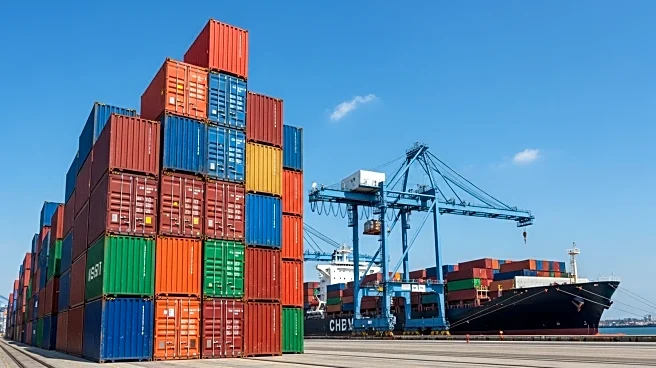What's Happening?
The Port of Vancouver, Canada's largest port, reported handling a record 85 million metric tons of cargo in the first half of 2025. This represents a 13% increase compared to the same period in 2024. The surge is attributed to Canada's strategic shift to expand trade beyond the U.S., driven by ongoing tariff disputes with the Trump administration. The port has seen significant growth in exports of grain, energy, and fertilizers, with a notable increase in crude oil and canola oil exports. The Vancouver Fraser Port Authority, led by President and CEO Peter Xotta, emphasizes the port's critical role in supporting Canadian businesses as they seek new international markets.
Why It's Important?
This development highlights Canada's efforts to diversify its trade relationships amid strained economic ties with the U.S. The record cargo volumes at the Port of Vancouver underscore the country's pivot towards Asia and other international markets. This shift could have significant implications for U.S.-Canada trade dynamics, potentially reducing U.S. influence over Canadian exports. The increased export activity also suggests a strengthening of Canada's economic resilience, as it reduces dependency on a single trading partner. Industries involved in grain, energy, and fertilizer production stand to benefit from this expanded market access.
What's Next?
The Port of Vancouver is expected to continue its expansion efforts, with ongoing investments in infrastructure to enhance capacity and reliability. Projects like the Roberts Bank Terminal 2 are part of these efforts. As Canada continues to open new trade routes, including its first LNG export terminal on the Pacific coast, further growth in trade with Asian markets is anticipated. This could lead to increased competition for U.S. exporters, particularly in the energy sector, as Canada offers logistical advantages over U.S. Gulf Coast exports.
Beyond the Headlines
The shift in Canada's trade strategy may have broader geopolitical implications, potentially altering North American trade dynamics. As Canada strengthens ties with Asian markets, it could influence regional economic alliances and trade policies. Additionally, the environmental impact of increased export activities, particularly in energy, may become a point of discussion among stakeholders concerned with climate change and sustainability.









